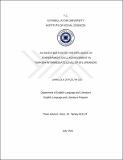Please use this identifier to cite or link to this item:
http://hdl.handle.net/11547/2121| Title: | AN INVESTIGATION ON THE INFLUENCE OF TEMPERAMENT ON L2 ACHIEVEMENT IN TURKISH INTERMEDIATE LEVEL OF EFL SPEAKERS |
| Authors: | Jocelyn Ojo, Damilola |
| Keywords: | EFL Speaking Personality Eysenck Phlegmatic Sanguine Choleric Melancholic L2 L1 SLA EFL Konuşma Kişilik Eysenck Ağırkanlı İyimser Asabi Melankoli L2 L1 SLA |
| Issue Date: | 2016 |
| Publisher: | ISTANBUL AYDIN UNIVERSITY INSTITUTE OF SOCIAL SCIENCES |
| Abstract: | Since the dawn of psychology, there have been studies conducted to understand human beings behavior and reason behind these actions and reactions and how it affects language acquisition, including L2 acquisition. This study examined the awareness of temperament types among Turkish L2 speakers, and went on to analyze if and how the various temperament affect language learning, acquisition and skills in intermediate level Turkish English language learners. The primary data consisted of 50 males and females to make a total of 100, all took a personality test to determine the category they belong to in their temperament, and in addition went through tests based on different language: vocabulary, grammar, comprehension, and reading, while also being tested in an oral interview for the speaking aspect of L2. The subjects for data collection were purposively selected, and the collated data were analyzed using SPSS (version 20.0) while utilizing ANOVA and Spearman’s Correlation Analysis. The findings showed that there was a limited knowledge of what the four temperaments are by the respondents. However, some have an idea what their temperaments might be. This means that majority are aware of the differences in human behavior, and some actually took their time to study what temperaments may be and how it affects human behavior. There was the high awareness of sanguine-phlegmatic tendencies by the respondents. In addition, the role that temperament played in reading is important, which means that the temperament one has goes a long way to either positively or negatively influence the ability to read in English. However, when it came to writing, speaking and listening, the influence of temperament may not be important as they were not significantly correlated to any temperament type. The study concluded that the findings have serious implication for both the students of EFL and the language teachers, and that temperament shows some kind of role in the performance of the second language learning in Turkish learners. Also the teachers should encourage the most reticent students by increasing opportunities for communication and try to make sure that the most outspoken do not drown the latter or hinder them from learning. |
| URI: | http://hdl.handle.net/11547/2121 |
| Appears in Collections: | Tezler -- Thesis |
Files in This Item:
| File | Description | Size | Format | |
|---|---|---|---|---|
| 447814.pdf | 1.37 MB | Adobe PDF |  View/Open |
Items in DSpace are protected by copyright, with all rights reserved, unless otherwise indicated.
